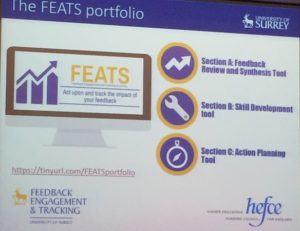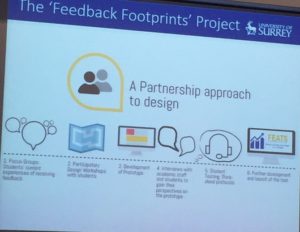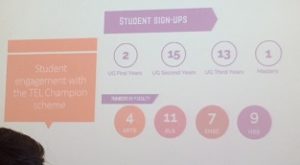The Change Agents’ Network is a network of staff and students who work ‘in partnership to support curriculum enhancement and innovation’. It is supported by Jisc. This year’s annual conference took place in Winchester. The theme was ‘Partnerships in an Age of Change’.
I decided to attend because many of the parallel sessions focussed on working in partnership with students on Technology Enhanced Learning projects. My role of Learning Technologist is mainly staff facing. At this conference, all the sessions were co-presented by students and staff. This was a great chance to hear directly from students about the benefits of working in partnership on development projects. Students highlighted the following key benefits
- transferable skills
- opportunities for networking
- being involved in driving change
- breaking down the ‘us and them’ perception of students and ‘the university’
For staff, partnership projects provide the chance to work with students as colleagues. Students can help staff with professional development and building digital capabilities. It’s a chance to build strong relationships at a time when mass higher education can sometimes lead to feelings of alienation and anonymity for students.
Highlights from the parallel sessions
A staff-student co-design approach to developing a VLE feedback portfolio – University of Surrey
 At the University of Surrey, staff and student interns have worked together to involve students in a co-design process to develop a feedback portfolio. The result is the Feedback Engagement and Tracking portfolio (FEATs), which is due to be rolled out to all undergraduate and postgraduate students from 2019. It provides a system where students can engage with their feedback, access resources and create action plans. The portfolio system seeks to address the challenge of student engagement with feedback.
At the University of Surrey, staff and student interns have worked together to involve students in a co-design process to develop a feedback portfolio. The result is the Feedback Engagement and Tracking portfolio (FEATs), which is due to be rolled out to all undergraduate and postgraduate students from 2019. It provides a system where students can engage with their feedback, access resources and create action plans. The portfolio system seeks to address the challenge of student engagement with feedback.
Students took part in design workshops where they worked individually and then in groups. First they recorded their experience of receiving feedback. They recorded this visually using drawing, post-its and playdoh. Some of the key problems identified were
- The modular, fragmented nature of feedback
- Not knowing how to interpret feedback, or how to improve
- Not knowing how to get help
- No space for dialogue
- Feeling like a passive recipient of feedback
 Students then worked individually and in groups to map out what they thought a portfolio solution might look like. The design ideas were carried forward into the system prototype. Academic staff were involved in curating help resources.
Students then worked individually and in groups to map out what they thought a portfolio solution might look like. The design ideas were carried forward into the system prototype. Academic staff were involved in curating help resources.
Students valued the chance to make individual contributions to the design. For students who took part in the co-design workshops, staff reported that there was a shift in perspective, to thinking ‘what can I do differently when I received my feedback?’ Feedback workshops embedded in the curriculum aim to engage all students with this approach. There are plans to use the personal tutoring system to gather feedback which will continue to improve the tool.
Involving students in a co-design process seems like a great way to develop a tool which reflects students’ needs, and has resulted in significant uptake of the tool.
Student partnerships for TEL projects and digital skills: TEL champions, Student Tech Mentors, Student Training Advisers and Student Media Assistants
University of Winchester, University of Hertfordshire, London School of Economics
There were a number of parallel sessions about schemes where students support digital skills development and TEL development projects.
 The University of Winchester has developed a network of TEL Champions. They are students from all years who volunteer to provide training for staff and students, supporting digital capabilities. When the scheme was established, it was considered important to provide opportunities both for students who are confident with technology, and also those who are less confident and want to develop their skill set. TEL Champions also work with the TEL team to identify areas for improvement and create video case studies to share good practice.
The University of Winchester has developed a network of TEL Champions. They are students from all years who volunteer to provide training for staff and students, supporting digital capabilities. When the scheme was established, it was considered important to provide opportunities both for students who are confident with technology, and also those who are less confident and want to develop their skill set. TEL Champions also work with the TEL team to identify areas for improvement and create video case studies to share good practice.
There is also a scheme for Student Fellows to work on projects such as developing consistent, streamlined course layouts during the transition to a new VLE, or collating input from employers about digital skills which are important to them, for example.
 At the University of Hertfordshire, 14 Student Tech Mentors based in 10 schools work with staff to provide one-to-one support to build digital skills. They also support group training. They use the ‘Guided Learning Journeys’ framework as a set of pedagogic principles to support staff. This framework was developed with input from students. Students have had a chance to build transferable skills and confidence. Although some staff were initially reluctant to seek help from student advisers, positive word of mouth has led to significant uptake of the scheme. A further 10 Student Tech Mentor positions will be created to support a new digital reading list platform.
At the University of Hertfordshire, 14 Student Tech Mentors based in 10 schools work with staff to provide one-to-one support to build digital skills. They also support group training. They use the ‘Guided Learning Journeys’ framework as a set of pedagogic principles to support staff. This framework was developed with input from students. Students have had a chance to build transferable skills and confidence. Although some staff were initially reluctant to seek help from student advisers, positive word of mouth has led to significant uptake of the scheme. A further 10 Student Tech Mentor positions will be created to support a new digital reading list platform.
At the London School of Economics, Student Training Advisers (STAs) facilitate IT Skills and Digital Literacy workshops. They use a problem-based learning model where learners (who could be staff or students) are provided with a series of problems to solve during the workshop. The STAs use coaching techniques, asking questions which encourage learners to find solutions for themselves. At the end of the session, they provide guidance about the most efficient solution. The feedback from learners, received in real time, can be used to modify the workshop in response to learners’ needs.
At London School of Economics, they have also worked with student media assistants who produce video summaries to capture student experiences of using technologies (for example software for note taking in class). This was part of a much broader project (LSE 2020) to consider what learning technologies will look like in the institution in the future.
For all these schemes, it’s important that they work with a flexible level of commitment from students, so they can fit them in around their studies. Some universities offer paid opportunities, while others are voluntary schemes which link to university skills badging or awards (equivalent to our Bath Award).
Working together to make Course Committees better, Nottingham Trent University
In this session, a recurring theme of the conference cropped up again: the assumptions that staff make about student views, and vice versa. Most of the time in course committees was being spent trying to resolve issues raised by student representatives, with less time dedicated to discussing the successes of the course and course development. A student on placement led a small scale enquiry into the views of committee members.
Staff sometimes made the assumption that students weren’t really interested in course development. When asked for their views, students wanted an opportunity to be more involved – but they were often attending meetings without having been given a chance to prepare, or any training as to what to expect or how to contribute. The team developed workshops and resources to support good practice in relation to course committees. The aims were to help course teams plan and manage the agenda more effectively, to capture and act on feedback from students, to close the feedback loop and to make sure everyone can contribute.
The approach could be useful for meetings of all types, especially where student representatives are asked to feed back their views. Providing clear information and setting expectations in advance enables staff and students to work together more effectively, and gives greater space for students to contribute.
Reflections
It was great to hear directly from students about their work in partnerships or as researchers (working to investigate student orientation towards feedback, or employers’ views of graduate skills, for example). In all the projects, it was clear that there’s a great deal of benefit for the university to partnership working. It was also very evident from the students’ confident and articulate presentations that they are developing their skills and confidence by participating in partnership projects.
Working with students as technology mentors provides a great way to support digital capabilities for students and staff. Involving students in capturing video to record the student voice provides a direct way of recording students’ actual experiences (sometimes during student consultation, the true student voice seems to get lost in generic ‘strategy speak’).
When designing the curriculum (including opportunities to embed digital skills provision) it pays to begin with a blank sheet, and ask students what is their experience. Using creative or visual ways to record this can be a great way to reveal common issues faced by students. In this way, students are involved in defining issues as they see them, and then building on this to develop solutions, rather than simply consulting them on solutions which staff think might work best, based on their assumptions.
To find out more, keep an eye out for further resources from the Change Agents Network conference.